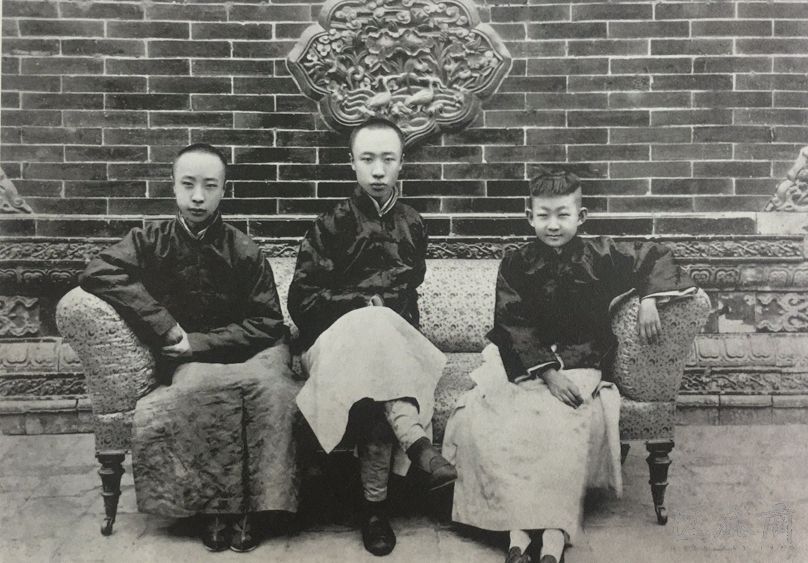Runqi Wang on:
[Wikipedia]
[Google]
[Amazon]
Gobulo Runqi (郭布羅润麒) (July 8, 1912 – June 6, 2007) was a member by right of birth of the Gobulo clan, part of the prestigious Plain White Banner group of the Qing dynasty and brother of
 In 1932 he married Jin Yunying, the third younger sister of Pu Yi and they had three children: Zongyan (宗 弇), Zongguang (宗 光) and Manruo (曼 若). After his marriage, Pu Yi sent him to Japan for military studies, accompanied by his wife.
Runqi served in the Japanese puppet state of
In 1932 he married Jin Yunying, the third younger sister of Pu Yi and they had three children: Zongyan (宗 弇), Zongguang (宗 光) and Manruo (曼 若). After his marriage, Pu Yi sent him to Japan for military studies, accompanied by his wife.
Runqi served in the Japanese puppet state of '' As long as I live, I will not allow irresponsible fabrications and even personal insults about Wanrong's life story! Insulting!"
On October 23, 2006, a ritual burial in the Western Qing Tombs for his half-sister Wanrong was performed at his request.
He died on June 6, 2007, at the age of 94 in Beijing, China.
Wanrong
Wanrong (; 13 November 1906 – 20 June 1946), of the Manchu Plain White Banner Gobulo clan, was the wife and empress consort of Puyi, the last Emperor of China, sometimes anachronistically called the “Xuantong Empress”, referring to Puy ...
, the last Empress Consort of China.
He served under the Japanese puppet Manchukuo
Manchukuo, officially the State of Manchuria prior to 1934 and the Empire of (Great) Manchuria after 1934, was a puppet state of the Empire of Japan in Northeast China, Manchuria from 1932 until 1945. It was founded as a republic in 1932 afte ...
regime in the 1940s until its collapse, and in later life, ran an acupuncture centre from his home in Beijing.
Biography
Runqi came from the Gobulo clan, a family closely linked to the imperial House of Aisin-Gioro. He was born in Beijing on July 8, 1912, shortly after the fall of theQing dynasty
The Qing dynasty ( ), officially the Great Qing,, was a Manchu-led imperial dynasty of China and the last orthodox dynasty in Chinese history. It emerged from the Later Jin dynasty founded by the Jianzhou Jurchens, a Tungusic-speak ...
following the Xinhai Revolution
The 1911 Revolution, also known as the Xinhai Revolution or Hsinhai Revolution, ended China's last imperial dynasty, the Manchu-led Qing dynasty, and led to the establishment of the Republic of China. The revolution was the culmination of a d ...
.
In 1922, after the marriage of his sister to Puyi, the last emperor of China, he began spending time in the Forbidden City
The Forbidden City () is a Chinese palace, palace complex in Dongcheng District, Beijing, China, at the center of the Imperial City, Beijing, Imperial City of Beijing. It is surrounded by numerous opulent imperial gardens and temples includ ...
. In 1932 he married Jin Yunying, the third younger sister of Pu Yi and they had three children: Zongyan (宗 弇), Zongguang (宗 光) and Manruo (曼 若). After his marriage, Pu Yi sent him to Japan for military studies, accompanied by his wife.
Runqi served in the Japanese puppet state of
In 1932 he married Jin Yunying, the third younger sister of Pu Yi and they had three children: Zongyan (宗 弇), Zongguang (宗 光) and Manruo (曼 若). After his marriage, Pu Yi sent him to Japan for military studies, accompanied by his wife.
Runqi served in the Japanese puppet state of Manchukuo
Manchukuo, officially the State of Manchuria prior to 1934 and the Empire of (Great) Manchuria after 1934, was a puppet state of the Empire of Japan in Northeast China, Manchuria from 1932 until 1945. It was founded as a republic in 1932 afte ...
. During the Soviet invasion of Manchuria in 1945, Runqi was captured by the Soviet army, later being tried before a war criminals court in China. He was released at the age of 45 in 1957, and worked in agricultural before being employed at the Institute of Legal Research in the Chinese Academy of Social Sciences.
In the early 2000s he ran an acupuncture and traditional Chinese medicine
Traditional Chinese medicine (TCM) is an alternative medical practice drawn from traditional medicine in China. It has been described as "fraught with pseudoscience", with the majority of its treatments having no logical mechanism of action ...
centre from his home.
In 2005 at the age of 93, Runqi, angered and upset at how the media were portraying his late sister, sued, saying See also
*Jin Yunying
Jin is a toneless pinyin romanization of various Chinese names and words. These have also been romanized as Kin and Chin (Wade–Giles). "Jin" also occurs in Japanese and Korean.
It may refer to:
States Jìn 晉
* Jin (Chinese state) (晉國), ...
* Western Qing Tombs
References
{{Reflist 1912 births 2007 deaths Chinese princes People of Manchukuo